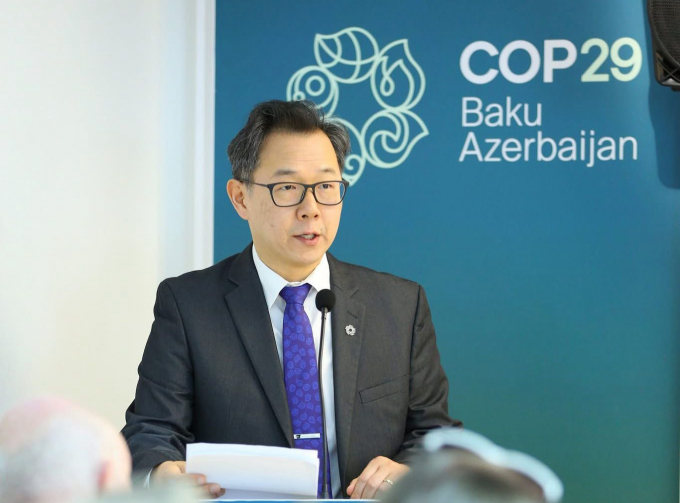Distinguished delegates, esteemed colleagues,
It is a great pleasure and honor to join you today. I am especially pleased to return to Azerbaijan—a country that has demonstrated exceptional leadership in fostering global solidarity and cooperation. I had the privilege of witnessing Azerbaijan’s successful hosting of COP29 last year led by President Aliyev and the governments, NGOs and people of Azerbaijan. Baku brought together over 80,000 participants from around the world, including almost 10,000 civil society representatives, making it one of the largest NGO representations in COP history. Such an impressive turnout is a testament to the country’s commitment to
inclusive dialogue and meaningful multilateral engagement.
I was particularly impressed by Azerbaijan’s leadership in creating the Global South NGO Platform, launched during COP29, which offered us a bold and practical step forward.
Ladies and Gentlemen,
Some say the international forum is where the people comes to talk, and talk, and talk. But today, I believe we are here not just to talk—but to listen, to learn, and most importantly, to act together.
UN Secretary-General António Guterres has repeatedly underscored the value of South-South cooperation as a vital mechanism for addressing the world’s most pressing challenges. In an era defined by interconnected crises—climate change, inequality, food insecurity and conflicts—our greatest strength lies in collective action, mutual support, and shared innovation. South-South cooperation is not a theoretical ideal—it is a practical, powerful tool for implementing the SDGs.
By exchanging knowledge, technology, and experience, developing countries can reinforce one another’s efforts and build inclusive, resilient societies.
In this regard, I highly praise Azerbaijan’s leadership in initiating Global South NGO Platform and today’s forum.
None of this can be achieved without robust engagement from civil society. NGOs, particularly those from the Global South, are essential actors in our shared mission to achieve the SDGs. Their close ties to communities, understanding of local realities, and ability to mobilize public support make you indispensable partners.
Yet we must recognize a persistent challenge: the underrepresentation of NGOs from the Global South in global policy-making platforms. Currently, the Global South comprises almost 70% of the total UN membership. However, less than 40% of NGOs with consultative status at ECOSOC are based in the Global South.
This disparity underscores the need for greater inclusion of Global South perspectives in global policy-making platforms. This imbalance limits the influence of those most directly affected by the global issues we seek to address.
Let me briefly walk you through a few key points that illustrate both the opportunities and the disparities in NGO engagement at the UN.
- The Founding Fathers of the UN in 1945, have already called for NGO engagement in the United Nations. Article 71 enables ECOSOC to consult with NGOs. ECOSOC Resolution 1996/31 lays out how.
-
NGOs play critical roles:
raising awareness, offering expert analysis, helping monitor commitments, and serving as early warning agents. -
With consultative status, NGOs can attend UN meetings, submit statements,
organize side events, and connect with diplomats and UN staff. -
When the UN was founded, there were only 40 accredited NGOs.
Today, that number has grown to over 6,500. - But over half are based in Western Europe and other developed regions. Out of 6,500 NGOs 19% are from Africa, 17% from Asia, 6% from Latin America and Caribbean and only 3% from Eastern European Countries.
- The top 20 countries—just 10% of UN Member States—account for nearly two-thirds of all accredited NGOs. Most of them are from the Global North.
Many countries from the Global South have very few, and some have none at all.
This is not fair. This is a lost opportunity—for those countries and for the international community.
Colleagues,
I must stress that we must correct this imbalance NOW. I encourage more NGOs from the Global South to apply for consultative status with ECOSOC.
We need You, You need us and You need you.
The process is accessible, and the benefits are considerable—not only for the organizations themselves, but for global governance as a whole. With over 1,000 NGO representatives from 137 countries endorsing the “Support for the Global South” statement, this initiative embodies collective determination for a more inclusive, equitable, and action-driven multilateral system.
Ladies and Gentlemen,
Time is not on our side. We are just five years away from 2030,
and the SDGs remain at risk. The good news is: we know what needs to be done—
and we know that we are stronger when we work together.
Let us ensure that the voices of the Global South are not only heard, but amplified—and acted upon. Let us not wait for change—Let us be the change, together with our courage, unity, and urgency.
Thank you.


